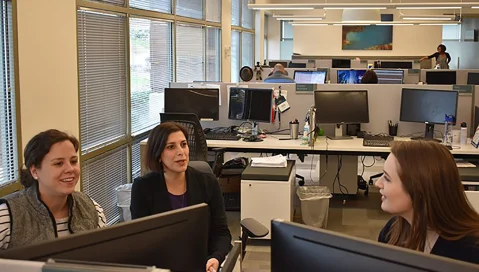Introducing Allison Fellner, Aptean's New Chief Human Resources Officer
Introducing Allison Fellner, Aptean's New Chief Human Resources Officer
Introducing Allison Fellner, Aptean's New Chief Human Resources Officer
Mar 25, 2018
Aptean Staff Writer
Allison Fellner took a sideways turn from a consulting career into human resources and never looked back. She loves being able to combine strategic, problem-solving, and operational skills into one role at a company like Aptean “because people are the cornerstone of how you’re going to be successful as a business.”
We’re lucky that her redefined career path led her to Aptean, where she began serving as chief human resources officer early this year. We recently sat down with Allison to talk about her background, the role HR plays in how a company achieves its goals, and her early impressions of Aptean. Spoiler alert: they’re positive. “When people are that excited about what they do, it’s infectious,” she says.
Tell us about your background and what brought you to Aptean.
I’m a native Atlantan and I went to the University of Texas to study marketing and international business. I actually thought I’d work in an embassy somewhere. I studied French in high school and Russian in college. When I decided not to go down that path, I joined Accenture since I wasn’t sure what I wanted to do. Consulting is a great way to learn about different industries and different types of work. I started my career by designing systems in travel and transportation, government, and healthcare.
After a few years, while I loved Accenture, I didn’t love traveling five days a week. When somebody offered me an internal job doing program management and knowledge management, I decided to take it. That leader eventually asked me if I’d be interested in being his HR lead, and that’s actually how I made my way into HR. While at Accenture, I held almost every HR job out there. I was an HR rep, I was an HR supervisor, I did global programs. One of my bigger roles was as global employee relations director for Accenture when it was around 300,000 people.
I loved Accenture, but as the company kept growing exponentially, I felt I wanted to try a smaller environment. I decided to try something different and went to a 100-person management consulting firm called Jabian. It was a really good experience, because while I focused on HR strategy work at Accenture, I did a lot of HR operations work at Jabian. It was nice for me to reconnect with the fundamentals and foundation of HR.
In the end, though, I do like more of a balance between the operations and strategy side, so when the role at Aptean was presented to me, it was perfect because it allows me to do both. I get to spend a lot of time thinking about how HR can support the business and help us grow, but I also am responsible for all the processes that focus on taking care of our people on a day-to-day basis. To me, this is the best of both worlds.
After taking a sideways turn into HR, why did you continue to pursue a career in that role?
Being in HR at a consulting firm or a technology firm is appealing because people are so central to what makes the company successful. At Aptean, our people are central to everything – how we sell to customers, how we support them, how we develop products, how we promote our brand, etc. When you work in that kind of situation, leadership really values what HR brings to the table, because people are the cornerstone of how you’re going to be successful as a business. When I met with the leadership team during the recruiting process, that element of the company really came out.
What excited you about the opportunity to join Aptean?
I was very fortunate to know a lot of people who spoke highly about Aptean. I have former colleagues and mentors who consulted to Aptean. I also had a chance to meet Kim [Eaton, Aptean’s CEO] before I was being actively recruited. What I found in my initial interactions was that Aptean has a really talented group of people. What I remember about being interviewed was talking with people and how excited they were to tell me about Aptean and what they were doing and throw out ideas for us to talk about. When people are that excited about what they do, it’s infectious.
Coming here was also an opportunity for me to learn about technology and software, which is different from professional services. And I thought the size of the company was pretty great. For me, a 2,000-person company means there’s lots of different things going on, lots of opportunity, but it’s not so big that you can’t feel connected.
What are your initial observations about Aptean?
It really stands out to me how collaborative the culture is, how much interaction happens between people, and I think that’s great. People are always sitting at each other’s desks or in a booth having a conversation. Or I pass by someone’s desk and see they are on a video call with four other people from around the world. I also noticed that change is going on all the time here, and it’s good that we have a group of committed, talented people to help us manage through the change. Reinvention is a strength of the organization already, but we can continue to figure out how to do it better and how to absorb change.
Speaking of that, your team is developing change management training. What can you tell us about it?
Whether you think about change through innovation, products, acquisitions, or from an organizational perspective, we’re pretty good at adapting to it here. But we wondered if there was any way we can do better. We’re developing the curriculum now, but one module might be to help individual people absorb and manage through change for themselves. Another module might be how to lead others through change. We are all leading change all the time – maybe you are working with a customer on a release, maybe you are launching an internal initiative, maybe your team is restructuring – all of these are changes. The idea is to think about the different ways we at Aptean are involved in change and give people a practical approach to managing themselves and others through that change.
What role does HR play in helping a company achieve its goals?
We want to be strategic business leaders. A good HR person is balanced between the needs of the people and the needs of the business. Both are super-important and you don’t want to sacrifice one for the other. You always want to have both top of mind as you’re making decisions.
The first thing I want to understand is, what are our business objectives, how do we plan to accomplish them, and what are the human capital implications of that? The more I can understand our business and how we’re going to achieve a particular goal, the more I can think through how to better enable our people. I want to connect the dots between our business and how we can best coach and develop our teams.
While caring for our people continues to be primary focus of HR, we are also shifting to being more data-driven and analytical. So whether it’s understanding attrition, or engagement, or time to hire, or ramp-up time, or performance, we want to be more data-driven as we set direction.
How does an organization like Aptean compete against others for talent?
Having an employer brand is very important. We could be the greatest company on earth, but if we can’t articulate that well and get that message out to the right people, it’s going to be hard to attract the best talent. We need to be able to talk about who we are and why people should come here, and we want to have evidence points that show how we live that every day. And then team with groups like marketing to get those messages out into the marketplace. To make it really simple, it’s know who you are, consistently deliver on that, and make sure you’re getting that message out to the people you want to attract.
What role does HR play in communications at Aptean?
I think HR, marketing, and internal communications should be attached at the hip. That helps to ensure that our processes live up to our messages. It’s great to have an employer brand, but if you’re not living up to those brand statements, it doesn’t really matter. We’re here to make sure how we’re recruiting, how we develop employees, how we do performance management all align with who we say we are as a company.
HR also plays a role in trying to keep a pulse on the people, trying to anticipate areas of concern or excitement, and making sure that we’re addressing top-of-mind topics and raising them up to the leadership team. We work with people on a day-to-day basis. We’re ambassadors for the company in our own way, helping to make sure our people are getting the messages from our leaders and our leaders are hearing the voice of our people.
Blog





¿Todo listo para transformar tu negocio?
Tenemos el software especializado en tu sector que ayudará a tu organización a prosperar.



